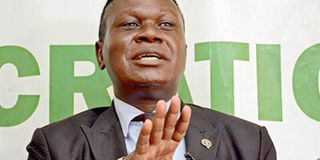Political parties decry shrinking space in Uganda

DP president general says they are ready to meet FDC and discuss the handover. Mao says they will be meeting the FDC party president, Patrick Amuriat and will hand over by the end of November. File Photo
KAMPALA. Political parties especially those in the opposition have blamed the hindrance in their development on the shrinking democratic space in Uganda which they say is engineered by the government in power.
Speaking during a National Dialogue on Political Parties and Constitutionalism, in Kampala on Friday, leaders of some of the opposition political parties cried foul of the government’s machinery in clamping down their activities.
The pre-independence day dialogue organised by the Uganda Human Rights Commission (UHRC) was held under the theme; Harnessing Political Diversity to Enhance Constitutionalism in Uganda.
The leaders of Democratic Party (DP), Forum for Democratic Change (FDC) and Uganda Peoples’ Congress (UPC) accused the ruling National Resistance Movement (NRM) of using the state apparatus like the army to ensure there is stunted growth of political parties.
They questioned whether the country can still freely practice multi-partism when the party in leadership has changed the constitution a number of times with an ‘intent of holding on to power’.
DP president general Mr Norbert Mao pointed out that the removal of the presidential term limits and the presidential age limits from the constitution is a sign that the NRM does not want to allow other parties to taste change in leadership of the country.
He also said that the government has made it difficult for the opposition political parties to mobilise and organise themselves because it only looks at the aspect of competition but not the growth of other parties.
“Political parties are indispensable in a democracy because here in Uganda the rules of the game are that the winner takes it all. This must be revised,” Mr Mao said.
He said that such challenges facing political parties have caused a crisis within them so much that they have lost confidence in their efforts to grow into bigger organisations.
Mr Patrick Amuriat, the FDC president said that much as the political parties are doing their best to practice internal democracy, there is limited room for mobilisation and organisation to challenge for national leadership.
He said the government under President Museveni has never favoured multi-partism adding that the restoration of political parties through the 2005 referendum, was because of pressure from the western world which was always urguing Uganda to open up for multiparty democracy.
“When the 1995 Constitution was promulgated, we breathed a sigh of relief that politics will be clean. But the old political parties were then meant to operate in abeyance. Now, what we see being manifested today is a result of pressure from the west that Mr Museveni was not willing to take,” he said.
UPC’s Jimmy Akena suggested that for Uganda to enjoy multipartism, there is need to change the system from presidential to parliamentary democracy whereby the formation of government would be guided by the strength each party has in parliament.
He insisted that the current system where the president is elected by the masses, creates a situation of having “super individuals” whose interests everyone one must play to.
However, Prime Minister, Dr Ruhakana Rugunda in a speech read for him by Ms Grace Kwiyucwiny the State Minister for Northern Uganda Affairs, emphasised that NRM government has made the condition favourable for the multiparty democracy.
The Prime Minister said that the NRM continues to be in leadership by not imposing itself to the population but through the mandate of the electorates who enjoy the achievements so far made.
“Perhaps, nobody appreciates more the critical importance of political parties to democratic governance than the NRM government since it is also the ruling political party that has enjoyed consistently the mandate of the people to continue on the steering wheel of government to deliver democracy, peace, security and development to Ugandans,” Dr Rugunda said.
He said that government recognises that political parties facilitate the realization of citizens’ rights to participate in the affairs of government.
Justifying the importance of the pre-independence day dialogue, Mr Med Kaggwa the Chairman of UHRC said that the multi-party system under which Uganda is being government is built on the growth of the political parties.
He said that since 2005, several political parties have been restored whereas many others have been formed and registered in the country. He added that now what is needed is to assess their performance to find out whether they are operating in compliance with the constitutional standards as prescribed under Article 71.




